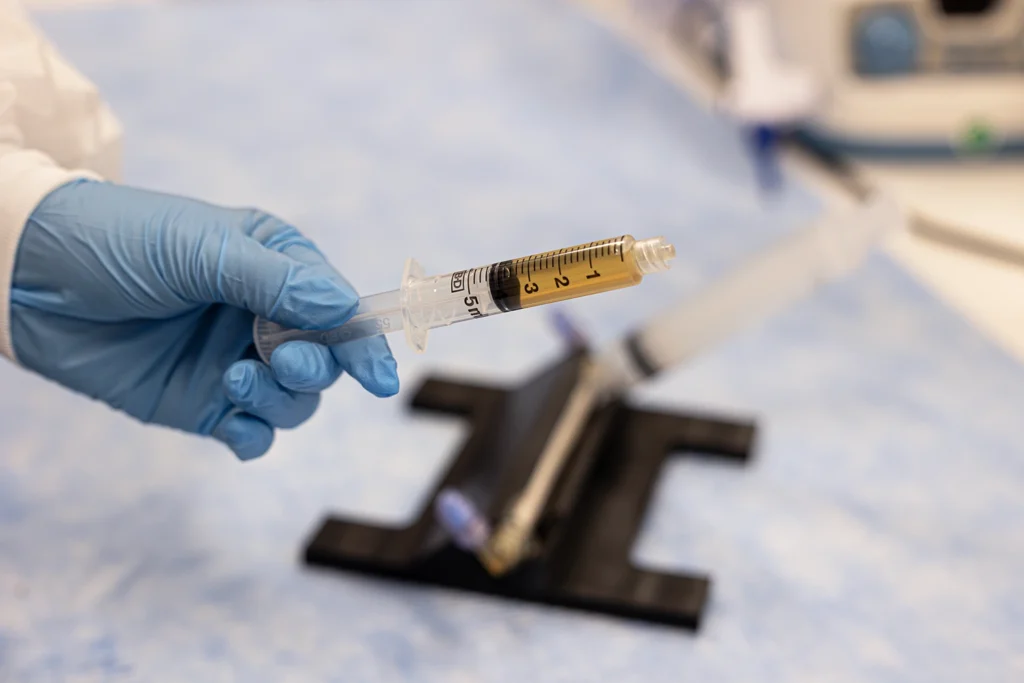Enhancing bioactivity with concentrated protein functionality
Low-volume 20 kDa plasma ultrafiltration efficiently concentrates plasma proteins by selectively retaining key biomolecules like albumin, fibrinogen, and growth factors, while removing excess fluid and small waste molecules. Its rapid processing and minimal sample loss make it ideal for point-of-care applications like PRP, and other autologous biologics. The device enhances bioactivity by preserving protein functionality without the need for harsh chemical treatments. This improves the therapeutic potential for tissue healing and repair. Additionally, its compact and scalable design allows for seamless integration into clinical and research workflows, optimizing plasma-based treatments and biomarker studies.

Fibrinogen plays a crucial role in wound healing and tissue regeneration by forming a fibrin scaffold that supports cell migration, angiogenesis, and extracellular matrix deposition. It enhances hemostasis and clot stability, providing a structural framework that promotes stem cell adhesion and growth factor retention at the injury site. Additionally, fibrinogen modulates inflammation by regulating immune cell activity, reducing excessive inflammatory responses while facilitating tissue remodeling. Its ability to create a biocompatible and bioactive matrix makes it valuable for regenerative applications, including tendon and ligament repair, wound healing, and orthopedic tissue engineering.
Alpha-2-Macroglobulin (A2M) is a broad-spectrum protease inhibitor that helps regulate inflammation by neutralizing catabolic enzymes like MMPs and cytokines, which contribute to tissue degradation. By preventing excessive inflammation and cartilage breakdown, A2M is particularly beneficial in osteoarthritis, tendon injuries, and joint degeneration. It also promotes a pro-healing environment by reducing oxidative stress and supporting tissue regeneration. As an autologous biologic, A2M-based therapies offer a natural, targeted approach to slowing degeneration and enhancing recovery in musculoskeletal and orthopedic applications.
Immunoglobulins can help regulate the immune system by potentially increasing the expression of inhibitory FcγRIIB receptors on immune cells, like macrophages. This can increase the threshold for activation of these cells, which can help reduce the overall inflammatory response. Immunoglobulins also play a crucial role in modulating inflammation, preventing infections, and promoting immune balance at the injury site. These proteins help reduce excessive inflammatory responses, creating a more favorable environment for tissue repair and regeneration. By neutralizing pathogens and regulating immune cell activity, immunoglobulins protect regenerating tissues from immune-mediated damage.
The CORE™ Ultrafiltration System with 20 kDa pore size filtration efficiently concentrates plasma proteins while removing excess fluids and small waste molecules, optimizing therapeutic potential in regenerative applications. Its polysulfone filtration material ensures high durability, biocompatibility, and low protein binding, preserving bioactive molecules critical for healing. The low priming volume minimizes sample loss, making it ideal for point-of-care and small-volume applications like PRP and autologous biologics. Additionally, the self-sealing valve port enhances usability by simplifying handling, reducing contamination risks, and ensuring a streamlined workflow in clinical and research settings.